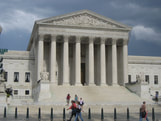 U.S. Supreme Court
U.S. Supreme Court One of many political issues currently in the forefront of the news, involves DACA or the Deferred Action For Childhood Arrivals program. DACA was created by Executive Order signed by President Obama in 2012 and affords protection to certain individuals brought to our country illegally as youths. In September 2017, President Trump announced that if Congress did not replace DACA with a more permanent solution by March 5, 2018, he would rescind the program.
Notwithstanding President Trump's March 5, 2018 DACA deadline, a California U.S. District Court recently ruled that President Trump could not unilaterally end DACA on March 5, 2018. The District Court ruling effectively extends the DACA program and eliminates the March 5, 2018 Congressional deadline. In an effort to expedite an appeal, the White House decided to bypass the Federal Appeals Court and go straight to the Unites States Supreme Court (USSC) to decide the issue once and for all. However, the USSC declined to hear the case without prejudice and directed the Court of Appeals in California to hear the case expeditiously.
The USSC's decision not to hear the case at this time, is not politically motivated as some would like to believe. Rather, the court's decision is based predominantly on a preference to have cases work through the lower courts as intended, before they will consider adding to their own docket. As the highest court in the land, the USSC has a limited amount of time in each session to hear cases. Therefore, the high court must be very selective and focus primarily on cases that have exhausted all lower court remedies. To decide otherwise in the absence of exigent circumstances, would result in the wheels of justice potentially grinding to a slow crawl.
Although Congress is no longer motivated by a DACA deadline, it is possible that Congress may actually do its job for once and resolve the DACA issue before it makes its way back to the USSC. If Congress succeeds in resolving the issue, they will not only presumably protect the DACA members but also help preserve the judicial economy of the USSC.
Long Island Lawyer
Paul A. Lauto, Esq.
www.liattorney.com


 RSS Feed
RSS Feed

